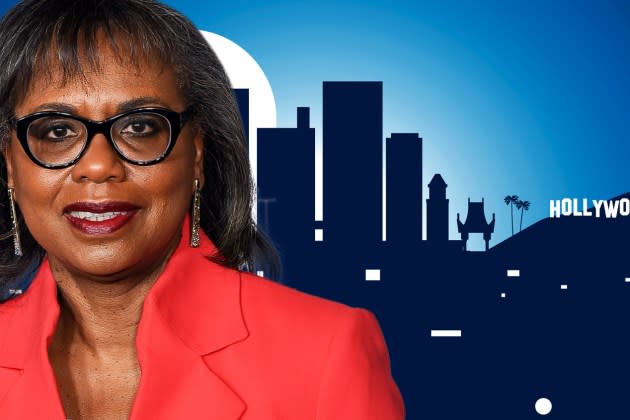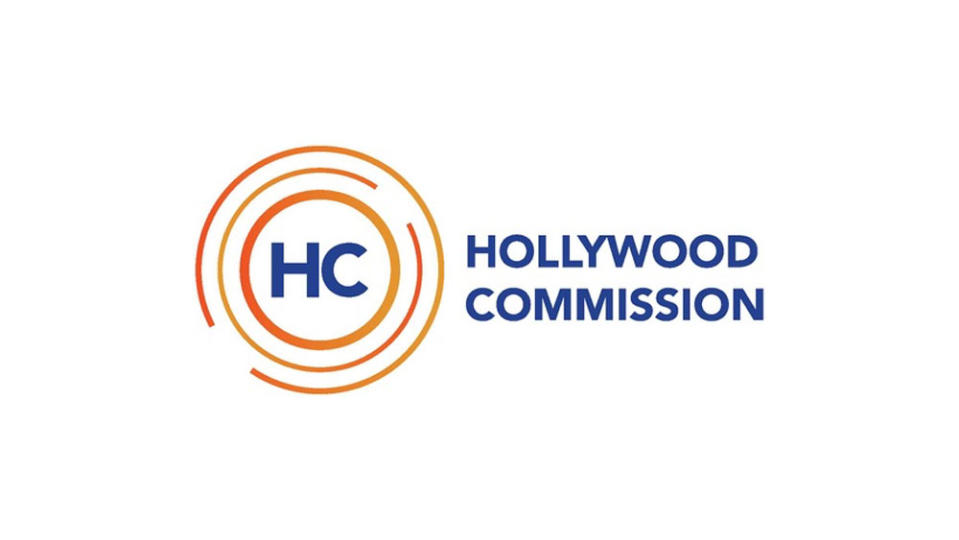“Lack Of Trust”: Dr. Anita Hill On Hollywood Workers’ Skepticism That Reporting Sexual Harassment & Discrimination Will Change Anything
- Oops!Something went wrong.Please try again later.

‘I think these problems extend beyond the entertainment industry, and that’s no excuse for what’s going on,” says Dr, Anita Hill of sexual harassment and discrimination in Tinseltown. “I think what I would also say is if there is any industry that should be operating from a place of inclusion, it’s the entertainment industry,” the chair of the multi-studio supported Hollywood Commission adds.
Dr. Hill’s remarks come as the Kathleen Kennedy and Nina Shaw-founded Commission this morning releases its second survey of the entertainment industry. And the 44-page report from the 2017 created organization is searing.
More from Deadline
DGA Awards Film Nominations: Gerwig, Nolan, Scorsese, Lanthimos & Payne
SAG Awards Nominations: 'Barbie', 'Oppenheimer' And 'Succession' Top List
Read the Hollywood Commission’s 2022-23 Entertainment Industry Report here.
Despite a noticeable rise in awareness of “what constitutes workplace misconduct, how to report it and how to address or response to retaliation” over the last Hollywood Commission survey of three years ago, confidence or belief that something would be done about such misconduct actually declined from the 2020 survey.
Compared to the last survey, 41% of entertainment workers who participated in the 2023 survey said they wouldn’t even bother to report an incident of misconduct because they “did not believe anything would be done.” In a damning response to the studios, HR departments and a million conferences and seminars, that’s a 24% jump over the 2020 survey, and a vote of no confidence by any other name.
“The problem is acute across the entire industry – on independent productions, many of which lack the structures and systems of the large studios, and at the large studios themselves, where 71% of workers believe it is unlikely that a powerful person will be held accountable,” the study admits.
The 110-question survey draws from a sample group of 5,259 members of the entertainment industry, (53.6% of that group identifying as women) and focuses at the scourge of sexual harassment, bullying, and overall bias and discrimination within the media workplace. Originally aiming for 20,000 responses when announced in late 2022, the just over 5,200 responses the 2023 survey received is down considerably from the 9,630 entertainment workers who participated in the Hollywood Commission’s last study released in 2020.
Perhaps that decline is indicative, because the fact is the 2023 survey released today paints a pretty bleak picture of where things are at over six years after the public accusations against the now incarcerated Harvey Weinstein offered at least the promise of a shift away from endemic abuse and a culture of cover-up.
“Perceptions of accountability have worsened in the last three years—and without accountability, there will be a permissive culture and climate for harassment,” the self-described “optimistic” 44-page report states. “For systems to work, workers must believe that their voices will be heard and their reports are meaningful—that something will be done.”
Still, with a three point action plan of accountability, prevention, and consistency, hope of sorts springs eternal at the Hollywood Commission.
For one thing, in stark contrast to every other group and demographic, straight white guys think everything is getting better, according to the 2023 report. However, taking the true blinders off, the Commission perceives an inflection point for Hollywood out of its latest findings. In a tale of two realities, the data “reveals an industry on the precipice of systemic change: one that overwhelmingly still struggles with its historical challenges but also one that has planted the seeds for a better industry,” their report says.
In that vein, Dr. Hill spoke with me about the new report, what it reveals and where Hollywood could be going,
DEADLINE: Dr. Hill, the report seems to offer both hope for the best of all possible outcomes down the line but finds the near worst of all possible realities on the front line of the industry with a workforce that doesn’t believe the system is really set up to protect them. What is your take on that?
DR. ANTIA HILL: Of course, I would love to have a report that says there is more accountability. That people understand that accountability is the glue. That they also understand that there are ways to address the problem, and acknowledge that there is a still a problem in the industry.
That didn’t happen.
But what I think did happen is the fact that people are more and more aware of what is unacceptable behavior in the workplace. And that really is one of the first steps in creating more accountability. Creating more action to actually change the behavior.
DEADLINE: From your results, it really appears to come down to a lack of trust, a lack of trust in the studios, production companies, in the very safeguards put in place in recent years, no? And that lack of trust has actually increased over your 2020 survey …
HILL: Absolutely, lack of trust is a big problem.
DEADLINE: What can be done?
HILL: This lack of trust, I think is borne out in a couple of ways. Overall, socially, there’s the lack of trust, but specifically for our issues that we work with, I think there was an anticipation there would be much more done by now. And I understand that.
So, I think that’s really where we are now.
Part of that comes from the increased awareness. Because now people have a better sense of how bad the problem is, to how to advocate for themselves. So, the fact that that sentence hasen’t changed to accommodate that, I think, may lend itself to the increase in the lack of trust.
DEADLINE: Looking over the Commission’s findings, that deep felt lack of trust in the system also emerges when you go into matters of inclusion and the hard wall of discrimination many hit after what some of your respondents basically call token efforts to hire people of color, women, LGBTQ+, the disabled and others …
HILL: Yes.
DEADLINE: We have seen other reports of late that say the renewed diversity, representation, and inclusion initiatives from the industry in the wake of the killing of George Floyd and the protests that followed have proven pretty much Potemkin Villages at best. The cutting of DEI programs and executives were among the cost cutting measures we saw by some studios last year. In that context, this report shows an industry that has lost interest in inclusion and has gone 10 steps backwards after three steps forward three years ago, don’t you think?
HILL: I think these problems extend beyond the entertainment industry, and that’s no excuse for what’s going on. I think what I would also say is if there is any industry that should be operating from a place of inclusion, it’s the entertainment industry.
The entertainment industry is the face of the population, it is where people see or don’t see themselves. So that’s a vital matter of representation, that is important. The other element of the importance of inclusion and diversity, and why we continue to talk about it, is that we know from all of the data that’s collected worldwide, we know that a desire for more inclusion is there. That they are open to making change that will reduce discord and reduce problems of discrimination and harassment. So, our work that we’re doing at the Hollywood Commission is helping to build on that, build on that inclusion.

DEADLINE: But with so many respondents, as a slice of the greater industry population, lacking faith in real results out of fancy HR protocols, in abusive bosses or superiors being held to task for their actions, how can that work?
HILL: For example, we have introduced our own bystander intervention training. That brings people together, different people, whether they are experiencing harassment or other kinds of experiences, are brought into the conversation. That they are brought into the solution for eliminating the problem. That’s the kind of inclusion that we’re hoping to build throughout.
I too would like, for the industry wide effort afterward, to be more inclusive, to take hold. I do honestly believe that the amount of abuse and harassment will end, and organizations will be at less risk if they bring a more diverse population – in front of and behind the camera.
DEADLINE: The Commission works with studios, streamers and dozens of organizations, since its founding, and in this report, you lay out three specific action items. Strengthen accountability, focus on prevention, and lead with consistency and integrity. What response are you expecting from the powers-that-be?
HILL: We are working on trying to build systemic change. We are working to address the problem with the system, with the structures that exist.
What we found is there are gaps in the system. What we have also found is that we can fill those gaps in parts with training that we offer. As I said, we do offer our own brand of a bystander training. Up to now we’ve educated and trained 4000 workers on inclusion and bystander intervention strategies.
We expect that we will be doing more of that training. We’re going to double down on that training in the next few months.
DEADLINE: And on a more organizational or corporate level?
HILL: We also work in ways that are collaborative, so that we bring in people from different parts of the entertainment industry, so that again, we can fill in the gap. So, one organization might be in the sector of the producers, and the other organizations might be in the Guilds and unions. When they can come together, they can help us really nail down where the gaps are. And therefore, we can provide greater awareness for example, through technology. Or we can provide systems that include our participation in collective bargaining. So, those are the things that I think have to happen. And that I think will be our efforts to continue to make happen, and that ultimately, we will be expanding.
DEADLINE: With that, with most of the results of this report, are you concerned that the Hollywood Commission’s work is simply too little, too late?
HILL: I would like to see more work, but it’s definitely not too late, in my opinion. We have seen changes occurring. For example, the survey shows us that awareness is increasing, and that awareness is not going to go away. It’s going to continue.
DEADLINE: Are the studios, agencies and streamers really committed to that work?
HILL: Well, we’ve also seen over the past few years, in a number of organizations that their workers have come together with their increased awareness, with their understanding that working to eliminate discrimination and harassment in their organizations will be better for everyone working in those organizations.
We’ve seen it happen. We’ve seen them disrupt that behavior. Based on those disruptions, we’ve also seen, based on those disruptions, them building some new structures within organizations that have begun to eliminate the problems. We’ve also seen some high-profile cases, and while those typically involves one organization or a small population, they are examples of what can happen when people take accountability seriously.
Best of Deadline
TV Cancellations Photo Gallery: Series Ending In 2024 & Beyond
2024 Premiere Dates For New & Returning Series On Broadcast, Cable & Streaming
2024 Presidential Election Debate Schedule: Dates, Times, Who'll Be There And Who Won't
Sign up for Deadline's Newsletter. For the latest news, follow us on Facebook, Twitter, and Instagram.

